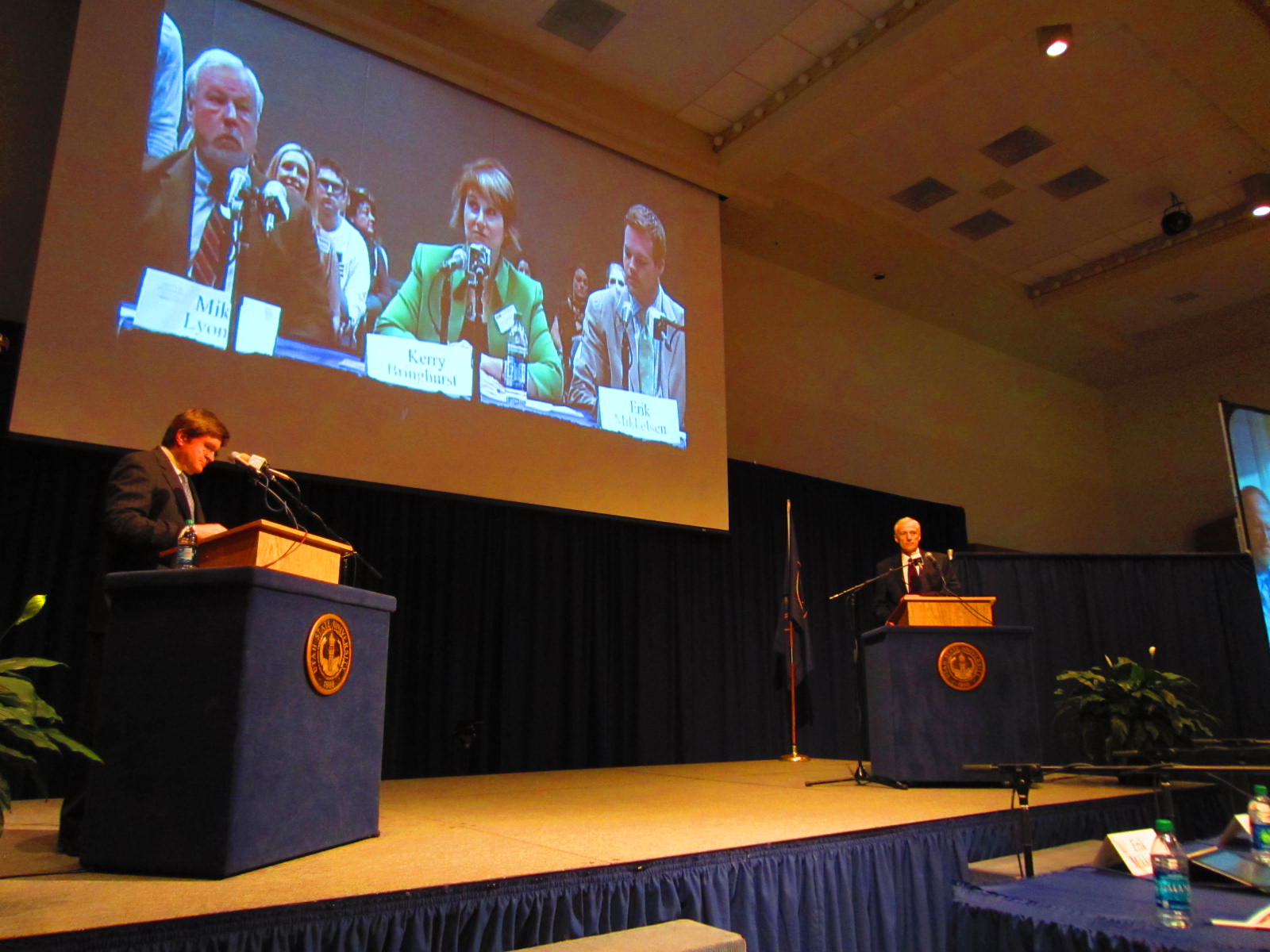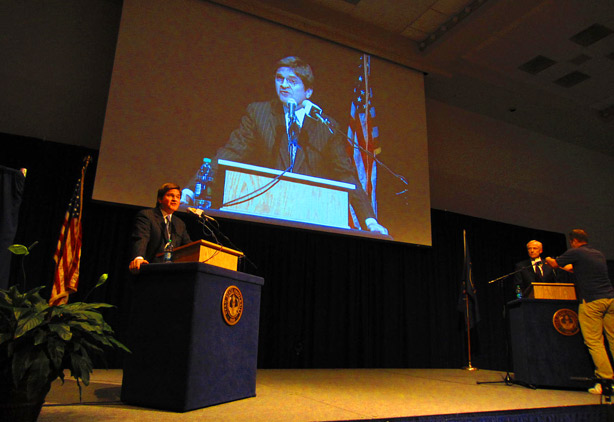Utah lieutenant guv hopefuls debate as Election Day ’12 nears
November 1st, 2012 Posted in OpinionStory & Photo by D. Whitney Smith
LOGAN—Economic recovery and new jobs helped produce $200 million more than originally projected for Utah public education last year, and Lt. Gov. Greg Bell said in a debate Wednesday that Utah residents should expect similar numbers this year.

Debate moderators, on screen question lieutenant governor candidates—Democrat Vince Rampton, left, and incumbent Republican Greg Bell. D. Whitney Smith photo.
With just six days to go before Election Day, Bell, the incumbent Republican, and his Democratic challenger Vince Rampton were at Utah State for the only debate between the Utah lieutenant governor candidates during this year’s campaign.
“I think we’ll have a good look at an increase in higher education [funding],” Bell told about 200 community members, faculty and students. “We want tuition growth to slow. We want the state to increase its contribution toward the expenses of university education.”
Bell’s remark came in response to a question from debate moderator Erik Mikkelsen, last year’s study body president and current student member of the Utah Board of Regents. Kerry Bringhurst of Utah Public Radio and political science Professor Michael Lyons joined Mikkelsen as moderators for the only lieutenant governor debate this election season.
Rampton is Democratic gubernatorial candidate Gen. Peter Cooke’s running mate. Cooke and several of his supporters watched the debate from the audience.
Rampton’s father, moderate Democrat Calvin Rampton, was a three-term Utah governor beginning in 1964. Since then, candidate Rampton said, the Democratic Party has become severely marginalized in Utah, to the point that many people say they don’t vote because “they know” the Republican candidates will win.
“That is the perception, that somehow the Democrats are the other party,” Rampton said. “First of all, I believe the Democratic Party has to shake off—and I’m sorry to bring this up in a secular institution—has to shake off the misconception that if you’re Democrat, you can’t be a good member of the LDS church. That is a myth, I think it has been busted well in this campaign cycle, but it needs to continue.”
Rampton said it is critical that Utah return to a healthy system of checks and balances by mitigating the growing problem of one-party, Republican domination of the Legislature and state government.
Bell’s riposte included a terse assertion that this is indeed a problem, but “it’s not a Republican problem,” he said.
“Republicans, over many years, have connected with the citizens of the state of Utah and have become a majority party,” Bell said. “I don’t think that’s a good situation. I wish there were two vibrant parties in the state of Utah. We need balance. We need offset. It’s not healthy for someone to have a supermajority.

Democratic Lt. Gov. Vince Rampton hopeful, left, and incumbent Republican Greg Bell, prepare for their debate at USU Wednesday. D. Whitney Smith photo.
“If the Democrats had a bigger participation, I think we’d have a healthier debate about issues,” Bell added, “and I think that would stimulate the electoral process. But Democrats and Republicans, in this time of polarization, have to battle their extremes.”
Rampton said multiple times how impressed and reassured he felt by the amount of interest evidenced by the large number of audience members—mostly students—who attended the debate.
An age group that usually votes Democrat and tends to harbor more liberal viewpoints, 18- to 29-year-olds make up 18 percent to 20 percent of Utah voters, Bell said, citing the governor’s website. Among college students, though, USU ranks third highest in voter turnout, behind Weber State and UVU.
However, party affiliations were not the only thing Rampton and Bell debated. Many questions the moderators asked concerned K-12 and higher education funding, planning and tuition.
“Many of our employers, especially high-tech employers, are telling us that we’re not able to supply the manpower that they need,” Bell said. “Not everyone needs a college education, but everyone needs something post-secondary. The high school degree is not enough anymore to provide a family wage.”
Bell took every opportunity he could to mention Gov. Gary Herbert’s “66 by 2020” plan, which is an initiative with the goal of at least 66 percent of Utahns earn some sort of post-secondary degree by the year 2020. Many Utah legislators have helped to drum up interest in this initiative by looking at Utah schools more holistically.
“There are many in the state of Utah who have a lot of college [education] but have never graduated,” Bell said. “For very little investment, we can help those folks graduate and have a marketable degree.”
Rampton said he and Cooke have a similar plan, which focuses on growing Internet classes to reduce costly statewide redundancies that tie up resources and bog down much-needed building space. He said focusing on STEM (science, technology, engineering, mathematics) preparation early in K-12 grades is another part of that plan. Rampton said he and Cooke would also incorporate regular statewide meetings in order to bring educators together to identify problem areas and monitor progress.
“Sixty-six percent is a laudable goal,” Rampton said. “However, the problem with reaching it, as Mr. Bell has suggested, is that there simply isn’t the basis. Too many people, [who] arrive at this institution and at any institution of higher learning in the state of Utah, come ill-prepared. They simply don’t have the basis in the lower schools, and the problem has been lack of funding.”
Responding to Bell’s claim that higher taxes is no good way to raise additional funding for public schools, Rampton said he and Cooke don’t plan to do raise taxes. Though it will be painstaking and difficult, he said a close look must be taken at the way Utah spends its budget, and then changes need to be made. This is how Rampton said schools should receive more financial help.
Rampton and Bell also discussed other key issues for this election season, such as the economy, unemployment, the environment and public lands. They were not afraid to call each other out on bluffs or misrepresentations of the facts, but overall the two maintained a courteous and respectful demeanor with one another.
USU Provost Raymond Coward said he was pleased with the event. “I think it was an interesting and informative discussion of key issues that face higher education,” he said. “I was particularly appreciative of the focus on higher education, but on other important issues that are facing our state, as well.”
USU senior Clint Call said he typically votes Republican and, though he found the debate informative, it didn’t necessarily pull him across the aisle.
“I was impressed,” Call said. “I hadn’t heard anything about Vince Rampton before. I was fairly impressed. I say that I’m Republican just because I align more closely with their beliefs, but I don’t agree with everything.”
Cache Valley resident Sharon Kline, who homeschools her children, brought her daughter Sierra, 12, to the event to help teach her about government and politics.
“It was interesting,” Sierra said. When asked if she liked one candidate better than the other she said, “I don’t know. I liked them both in different ways.”
TP
Tags: election 2012, Greg Bell, lieutenant governor debate, Peter Cooke, Vince Rampton

1 Trackback(s)
Sorry, comments for this entry are closed at this time.